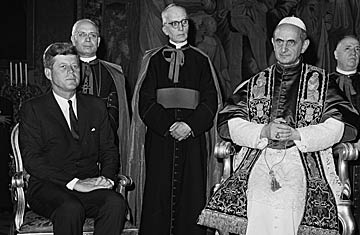
July 02, 1963: Pope Paul receives President John. F Kennedy in the Vatican City
(2 of 4)
Dr. L. Nelson Bell, executive editor of the biweekly Christianity Today (paid and free circ.: 160,000) and father-in-law of Billy Graham, was more alarmed. Too many Protestants, said he, are "soft" on Catholicism. "Pseudo tolerance is not tolerance at all but simply ignorance." If Jack Kennedy were to become President, he said, then Montana's Mike Mansfield would become Senate majority leader and Massachusetts' John W. Mc-Cormack would continue as House Democratic floor leader. "Both are fine men, but both belong to a church with headquarters in Rome." And to Bell, Rome was little better than Moscow: "The antagonism of the Roman church to Communism is in part because of similar methods." Dr. Harold J. Ockenga, of Boston's Park Street Church, compared Kennedy to Nikita Khrushchev, saying that each is "a captive of a system."
"Wall of Separation." Unanimously, the group adopted a declaration that had been largely framed beforehand—authors unknown. It was no less tough than the speeches, but more moderately expressed. In essence, it charged that the Vatican would sway any Catholic President in areas of foreign affairs, education and church-state relationships. "It is inconceivable," said the statement, "that a Roman Catholic President would not be under extreme pressure by the hierarchy of his church to accede to its policies with respect to foreign relations, including representation to the Vatican ... Is it reasonable to assume that a Roman Catholic President would be able to withstand altogether the determined efforts of the hierarchy to gain further funds and favors for its schools and institutions, and otherwise breach the wall of separation of church and state? . . .
"In various areas where they predominate," said one fire-breathing passage, "Catholics have seized control of the public schools, staffed them with nun teachers wearing their church garb, and introduced the catechism and practices of their church. In Ohio today—a state with a Roman Catholic Governor—according to an attorney general's ruling, Roman Catholic nuns and sisters may be placed on the public payroll as schoolteachers."*
After hearing an appeal to raise $20,000 (to carry the message to the "grass roots"), the group selected Peale to meet the press. Warned a conferee: "Say one wrong word, and the press will murder us —by next week we'll be out of business." Peale made a joke: "Pray for us while we are talking to those reporters." A soloist sang I Want to Be a Christian in My Heart, and Peale strode into the lions' den of waiting newsmen. Why had the churchmen not criticized the fact that Richard Nixon is a Quaker? Said Peale: "I didn't know that he ever let it bother him."
Why were not such liberal theologians as Reinhold Niebuhr present? Answered
Peale: "If he were here, we'd never get anything done."
Reaction came quickly from liberal Protestants who violently disagreed. Among them:
REINHOLD NIEBUHR, recently retired vice president of Manhattan's Union Theological Seminary: "Dr. Peale and I disagree on everything, religiously and politically."
